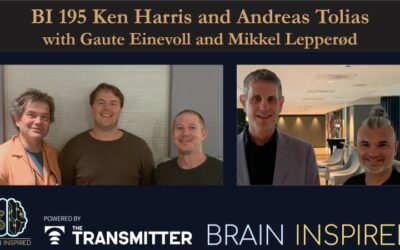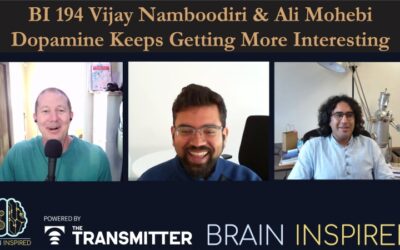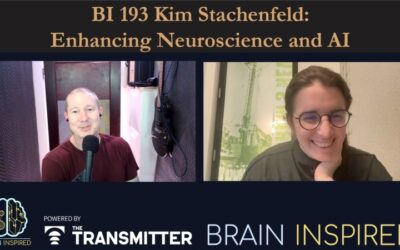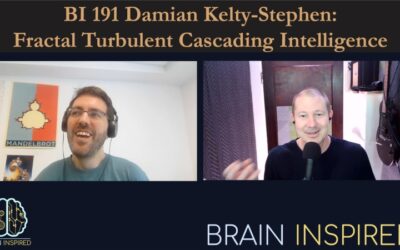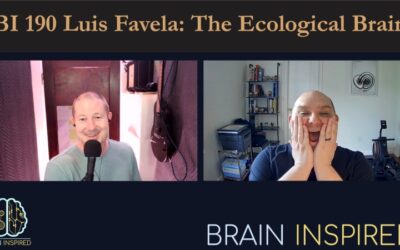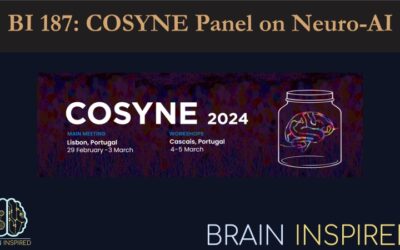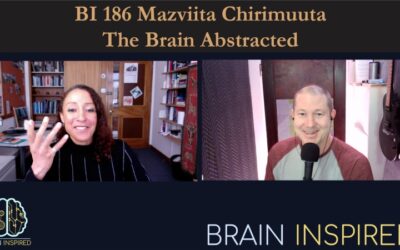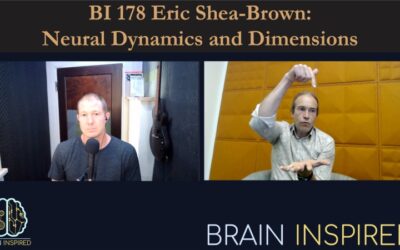All Episodes
BI 195 Ken Harris and Andreas Tolias with Gaute Einevoll and Mikkel Lepperød
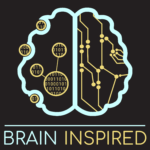
This is the first of two less usual episodes. I was recently in Norway at a NeuroAI workshop called Validating models: How would success in NeuroAI look like? What follows are a few recordings I made with my friend Gaute Einevoll. Gaute has been on this podcast before, but more importantly he started his own podcast a while back called Theoretical Neuroscience, which you should check out.
BI 194 Vijay Namboodiri & Ali Mohebi: Dopamine Keeps Getting More Interesting

The classic story is that dopamine is related to reward prediction errors. That is, dopamine is modulated when you expect reward and don’t get it, and/or when you don’t expect reward but do get it. Vijay calls this a “prospective” account of dopamine function, since it requires an animal to look into the future to expect a reward. Vijay has shown, however, that a retrospective account of dopamine might better explain lots of know behavioral data. This retrospective account links dopamine to how we understand causes and effects in our ongoing behavior. So in this episode, Vijay gives us a history lesson about dopamine, his newer story and why it has caused a bit of controversy, and how all of this came to be.
BI 193 Kim Stachenfeld: Enhancing Neuroscience and AI

Kim Stachenfeld embodies the original core focus of this podcast, the exploration of the intersection between neuroscience and AI, now commonly known as Neuro-AI. That’s because she walks both lines. Kim is a Senior Research Scientist at Google DeepMind, the AI company that sprang from neuroscience principles, and also does research at the Center for Theoretical Neuroscience at Columbia University. She’s been using her expertise in modeling, and reinforcement learning, and cognitive maps, for example, to help understand brains and to help improve AI. I’ve been wanting to have her on for a long time to get her broad perspective on AI and neuroscience.
BI 192 Àlex Gómez-Marín: The Edges of Consciousness

Àlex Gómez-Marín heads The Behavior of Organisms Laboratory at the Institute of Neuroscience in Alicante, Spain. He’s one of those theoretical physicist turned neuroscientist, and he has studied a wide range of topics over his career.
BI 191 Damian Kelty-Stephen: Fractal Turbulent Cascading Intelligence

Damian Kelty-Stephen is an experimental psychologist at State University of New York at New Paltz. Last episode with Luis Favela, we discussed many of the ideas from ecological psychology, and how Louie is trying to reconcile those principles with those of neuroscience. In this episode, Damian and I in some ways continue that discussion, because Damian is also interested in unifying principles of ecological psychology and neuroscience.
BI 190 Luis Favela: The Ecological Brain

Luis Favela is an Associate Professor at Indiana University Bloomington. He is part philosopher, part cognitive scientist, part many things, and on this episode we discuss his new book, The Ecological Brain: Unifying the Sciences of Brain, Body, and Environment.
BI 189 Joshua Vogelstein: Connectomes and Prospective Learning

Jovo, as you’ll learn, is theoretically oriented, and enjoys the formalism of mathematics to approach questions that begin with a sense of wonder. So after I learn more about his overall approach, the first topic we discuss is the world’s currently largest map of an entire brain… the connectome of an insect, the fruit fly. We talk about his role in this collaborative effort, what the heck a connectome is, why it’s useful and what to do with it, and so on.
BI 188 Jolande Fooken: Coordinating Action and Perception

Jolande Fooken is a post-postdoctoral researcher interested in how we move our eyes and move our hands together to accomplish naturalistic tasks. Hand-eye coordination is one of those things that sounds simple and we do it all the time to make meals for our children day in, and day out, and day in, and day out.
BI 187: COSYNE 2024 Neuro-AI Panel

Recently I was invited to moderate a panel at the annual Computational and Systems Neuroscience, or COSYNE, conference. This year was the 20th anniversary of COSYNE, and we were in Lisbon Porturgal.
BI 186 Mazviita Chirimuuta: The Brain Abstracted

Mazviita Chirimuuta is a philosopher at the University of Edinburgh. Today we discuss topics from her new book, The Brain Abstracted: Simplification in the History and Philosophy of Neuroscience.
BI 185 Eric Yttri: Orchestrating Behavior

Eric’s lab studies the relationship between various kinds of behaviors and the neural activity in a few areas known to be involved in enacting and shaping those behaviors, namely the motor cortex and basal ganglia. And study that, he uses tools like optogentics, neuronal recordings, and stimulations, while mice perform certain tasks, or, in my case, while they freely behave wandering around an enclosed space.
BI 184 Peter Stratton: Synthesize Neural Principles

What Pete argues for is what he calls a sideways-in approach. So a bottom-up approach is to build things like we find them in the brain, put them together, and voila, we’ll get cognition. A top-down approach, the current approach in AI, is to train a system to perform a task, give it some algorithms to run, and fiddle with the architecture and lower level details until you pass your favorite benchmark test.
BI 183 Dan Goodman: Neural Reckoning

You may know my guest as the co-founder of Neuromatch, the excellent online computational neuroscience academy, or as the creator of the Brian spiking neural network simulator, which is freely available. I know him as a spiking neural network practitioner extraordinaire. Dan Goodman runs the Neural Reckoning Group at Imperial College London, where they use spiking neural networks to figure out how biological and artificial brains reckon, or compute.
BI 182: John Krakauer Returns… Again

John Krakauer has been on the podcast multiple times (see links below). Today we discuss some topics framed around what he’s been working on and thinking about lately.
BI 181 Max Bennett: A Brief History of Intelligence

By day, Max Bennett is an entrepreneur. He has cofounded and CEO’d multiple AI and technology companies. By many other countless hours, he has studied brain related sciences. Those long hours of research have payed off in the form of this book, A Brief History of Intelligence: Evolution, AI, and the Five Breakthroughs That Made Our Brains.
BI 180 Panel Discussion: Long-term Memory Encoding and Connectome Decoding

/
BI 179 Laura Gradowski: Include the Fringe with Pluralism

Laura Gradowski is a philosopher of science at the University of Pittsburgh. Pluralism, or scientific pluralism anyway, is roughly the idea that there is no unified account of any scientific field, that we should be tolerant of and welcome a variety of theoretical and conceptual frameworks, and methods, and goals, when doing science. Pluralism is kind of a buzz word right now in my little neuroscience world, but it’s an old and well-trodden notion… many philosophers have been calling for pluralism for many years. But how pluralistic should we be in our studies and explanations in science? Laura suggests we should be very, very pluralistic, and to make her case, she cites examples in the history of science of theories and theorists that were once considered “fringe” but went on to become mainstream accepted theoretical frameworks. I thought it would be fun to have her on to share her ideas about fringe theories, mainstream theories, pluralism, etc.
BI 178 Eric Shea-Brown: Neural Dynamics and Dimensions

Eric Shea-Brown is a theoretical neuroscientist and principle investigator of the working group on neural dynamics at the University of Washington. In this episode, we talk a lot about dynamics and dimensionality in neural networks… how to think about them, why they matter, how Eric’s perspectives have changed through his career.
